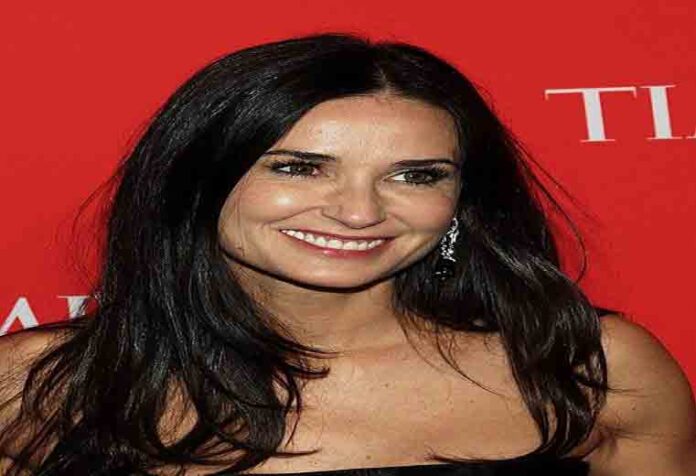Demi Moore recently opened up about her experiences with the script of the classic film ”Ghost,” revealing just how profoundly it affected her during production. She described the script as having a haunting quality that lingered long after she had finished reading it. The emotional depth of the story, coupled with its themes of love and loss, created an atmosphere that was both moving and eerie. Moore highlighted that she wasn’t just acting in a film; she felt an overwhelming connection to the material that compelled her to explore her own vulnerabilities. As she navigated her character’s journey, she found herself reflecting on her personal relationships and the fragility of life itself. Moore also shared insights into the creative process behind the film, emphasizing how the script’s intensity influenced the cast and crew. Several moments in the narrative demanded raw emotional performance, which required not only tremendous talent but also a safe space to express deeply buried feelings. The script’s ability to evoke such powerful reactions led to discussions among the cast that extended beyond the confines of the filming set. In those moments, they created a supportive environment where everyone could confront their own experiences of loss and longing, leaving an indelible mark on Moore that she carries to this day. This profound connection between the script and its performers reminds us of the enduring power of storytelling and its ability to resonate long after the final scene is shot.
Analyzing the Emotional Depth of Ghost and Its Enduring Legacy
The emotional resonance of *Ghost* transcends time, establishing a unique connection with audiences that continues to captivate viewers decades after its release. This iconic film masterfully blends suspense, romance, and supernatural elements, evoking profound feelings of love, loss, and redemption. Demi Moore’s recent comments about the script eliciting chills emphasize how powerful storytelling can stir deep emotional currents. The screenplay, coupled with moving performances, crafts a narrative that invites viewers to explore their sentiments surrounding grief and the afterlife, making *Ghost* not just a film, but an emotional experience in itself says to Discoverturkey.com reported.
Furthermore, the film’s enduring legacy can be attributed to its ability to tackle universal themes that resonate across generations. Through its portrayal of love transcending death, *Ghost* touches on:
- The fragility of human relationships – showcasing how love endures beyond physical separation.
- The power of closure – influencing viewers’ perspectives on unresolved issues with lost loved ones.
- Cultural impact – inspiring countless references in pop culture, from parodies to homages, keeping the narrative alive in contemporary discourse.
As evidenced by Demi Moore’s reflections, this emotional depth not only contributes to the film’s initial appeal but also solidifies its status as a classic, continuously reviving conversations about the emotional complexities of life and what lies beyond.
Insights into the Creative Process Behind Ghosts Script
The crafting of the script for “Ghost” epitomized a delicate balance between emotional depth and supernatural intrigue. Screenwriters Bruce Joel Rubin approached the narrative with the intention of intertwining love, loss, and the afterlife in a way that resonates universally with audiences. Key elements that contributed to the evocative nature of the script included:
- Character Development: The compelling arcs of Sam and Molly allowed viewers to emotionally invest in their journey, making the moments of suspense and tenderness all the more impactful.
- Innovative Themes: By addressing concepts of grief and redemption through a ghostly narrative, the film created a fresh perspective on love that transcends physical boundaries.
- Lyrical Dialogue: Rubin’s poetic approach to dialogue embedded layers of meaning that contributed to the film’s haunting quality, enhancing its romantic undertones.
With careful consideration of the emotional stakes, Rubin skillfully built suspense, ensuring that each scene would resonate with the audience. The unexpected blend of humor, romance, and the macabre was a deliberate choice to evoke a rich tapestry of emotions, allowing viewers to experience chills not just from the supernatural elements, but from the profound human connections at the story’s core. Elements of intrigue in the script included:
- Interactions with the Supernatural: The portrayal of the ghostly realm was designed to challenge perceptions of life after death, inviting audiences to ponder their beliefs.
- Symbolism: Items like the pottery wheel served as metaphors for creation and connection, enriching the narrative’s emotional impact.
- Sound and Visual Cues: The script emphasized a symbiotic relationship with the film’s visual and audio elements, culminating in a hauntingly immersive experience.

Recommendations for Exploring the Themes of Love and Loss in Film
Exploring the intricate themes of love and loss in film can be deeply enriching, offering audiences a chance to reflect on their own experiences. By examining iconic films that delve into these profound emotions, viewers can gain insight into the ways filmmakers uniquely portray these universal concepts. Consider including a diverse selection of films that showcase love’s multifaceted dimensions alongside the harrowing effects of loss, such as:
- Classic Romance: Films like “Casablanca” highlight the enduring power of love amidst the backdrop of war and personal sacrifice.
- Supernatural Elements: Entries like “Ghost,” where love transcends death, invite viewers to confront what it means to carry on after losing a loved one.
- Documentary Perspectives: Consider films such as “Griefwalker,” which illuminates the personal journeys of those coping with grief, laying bare the emotional complexities involved.
Moreover, engaging with the director’s intentions and the narrative choices made can serve as a catalyst for deeper understanding. Filmmakers often use visual and auditory cues to amplify the themes of love and loss. Pay attention to these elements as they can significantly shape the emotional landscape of a film. For instance:
- Cinematography: Notice how lighting and composition affect the portrayal of intimate moments between characters.
- Score and Sound Design: Powerful soundtracks can evoke nostalgia and bittersweet reminiscences that resonate profoundly with audiences.
- Character Arcs: Analyze how characters evolve through their experiences of love and loss, providing a lens through which viewers can relate their own stories.
